Spring 2025
The SDSU Rhetoric & Writing Studies Department Newsletter
Chair's Letter
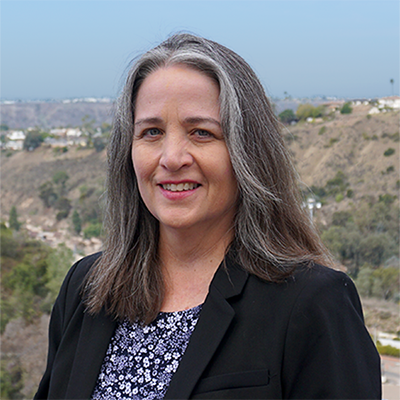 This spring semester ends, as so many others have, with commencement. So we end with
a beginning or we begin with an end. And we congratulate our Class of 2025 RWS graduates!
On Friday, May 16, 2025, we were excited to honor our graduates at our department
ceremony. While this marks the end of our graduates’ time with the department, it
also marks the beginning of what I am sure will be many more accomplishments in their
work with rhetoric and writing.
This spring semester ends, as so many others have, with commencement. So we end with
a beginning or we begin with an end. And we congratulate our Class of 2025 RWS graduates!
On Friday, May 16, 2025, we were excited to honor our graduates at our department
ceremony. While this marks the end of our graduates’ time with the department, it
also marks the beginning of what I am sure will be many more accomplishments in their
work with rhetoric and writing.
This has been a rewarding and challenging semester for RWS with several “firsts,” including the awarding of our first Outstanding Graduating Senior, Althea Millman, and the awarding of the Ann M. Johns Endowed Scholarship for Rhetoric and Writing Studies to its first recipient, Sammi Mrowka. You can read more about Mrowka in the newsletter with a focus on his experiences in the graduate program. We also thank Emerita Professor Ann Johns for her generosity in supporting the department and its students.
Another first for this semester has been our department’s offering of RWS 360W, a course developed and taught by Kimball Taylor in collaboration with SDSU’s Surf/Skate Collaborative. This course “applies an academic lens to the development of board sports, evaluating and analyzing the rhetorics that have defined, shaped, and explained these activities.” You can read more about Taylor in the newsletter.
This newsletter also features current undergraduate John Troja, and graduating senior Marrisa Lee, a double major in RWS and public relations. We share an overview of the 23rd Landmark Lecture, and highlight two of the alumni panelists who joined us: Erik Acosta (B.A.) and CiCi Hendricks (M.A.). In addition to our alumni who spoke about how rhetoric and writing studies informs their work in professional contexts, we were pleased to hear from our keynote speaker, Kendall Leon, who spoke on the many ways rhetoric matters.
While I am happy to share these wonderful events with you, I am also deeply saddened to share news of the passing of two beloved RWS colleagues and faculty members. We lost Roderick Michener in January and Chelsea Kerford in March, 2025. As we grieve for their passing, we also recall the many contributions they have made to the department and the impact their teaching and departmental work continues to make in the lives of the students they worked with and in our lives as their colleagues.
Kathryn Valentine,
RWS Department Chair
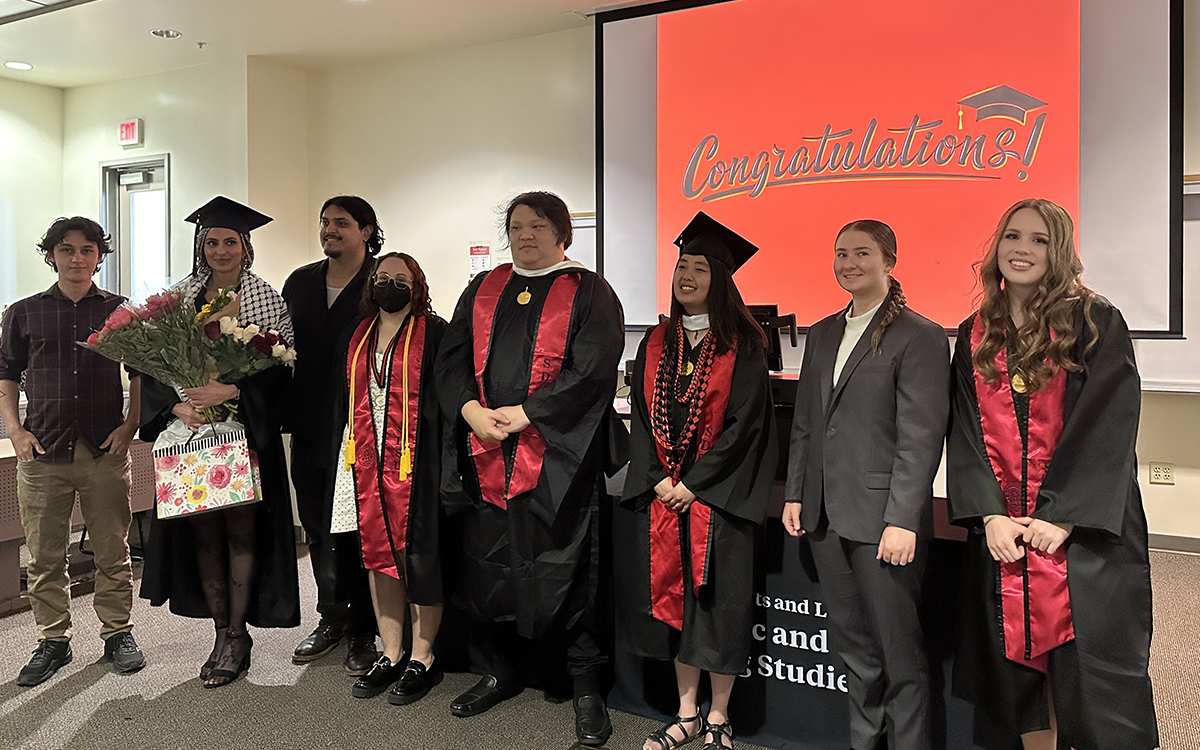
 Landmark Lecture
Landmark Lecture
Kendall Leon
This spring, the RWS Department welcomed Kendall Leon to speak at the 23rd iteration of the RWS Landmark Lecture: “Rhetoric at Work.” The Landmark Lecture is an annual event for scholars in the RWS field to come together and discuss on-going research and pedagogies. Through an alumni student panel and a keynote presentation, “Rhetoric at Work” shared “[insights] into the various pathways, ethical issues, and challenges that writing and communication professionals face in today’s global and diverse workforce.”
The department thanks undergraduate alumni Erik Acosta and John Berry, and graduate alumni Abe Alvarez and CiCi Hendricks for their participation on the panel. Led by Associate Professor Dustin Edwards, they spoke on how they navigate and succeed in their workplaces using skills learned from their study of rhetoric and writing while at SDSU. In particular, they named the ability to rhetorically analyze a situation as invaluable for their everyday work, from technical writing to grant writing and management.
The department is also grateful for Leon’s keynote presentation on how rhetoric and writing studies can prepare professionals with a “range of skills needed in industry settings.” Leon is a former CSU professor who specializes in Chicana rhetorics, community-engaged writing, and technical and professional communication. She has successfully stepped into writing-intensive industry roles, “[bridging] the academic-industry divide.” Her background allows her to explore the importance of rhetoric-related skills in the workplace. “Rhetoric and writing provides a framework and perspective that applies to all careers,” she explains. “[It] helps develop a rhetorical mindset grounded in awareness of the situation, audience attunement, genre analysis and linguistic competence and flexibility.”
Leon emphasizes “understanding user needs and practices” as increasingly crucial skills, following AI integration’s impact on the field of technical communication. She concludes her presentation with encouragement for young professionals in rhetoric and writing: “In today’s climate, we need more people in a range of careers thinking about ethics, power and agency, the material consequences of words, and the intent or motivation behind words and action. More emphasis on making and production than analysis and critique.”
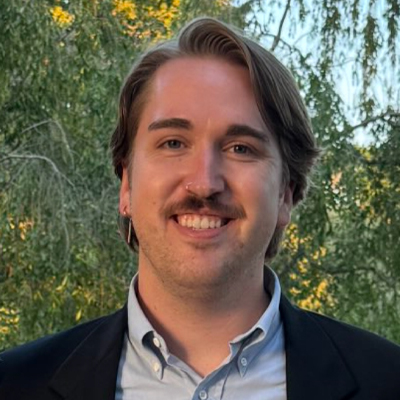 Undergraduate Major Profile
Undergraduate Major Profile
John Troja
A dedicated student of rhetoric, an aspiring educator, and an active community member, John Troja exemplifies the diverse and meaningful paths available to students in San Diego State University’s Rhetoric and Writing Studies (RWS) program. Now in his third year, Troja’s journey to RWS reflects both his passion for language and his drive to make a lasting impact in and beyond the classroom.
Originally entering SDSU as a Television, Film, and New Media (TFM) major, Troja discovered the RWS program through his sister, who had studied the field when she was in college. However, it was his experience in RWS 200 that solidified his decision to change paths. “I was hooked,” he recalls. The course introduced him to rhetorical concepts in a way that felt both intellectually engaging and personally meaningful.
Troja’s background is quite unique. He has worked professionally as a copywriter and pastry chef and is currently gaining hands-on experience as a student teacher at a local high school. His weekends are spent volunteering at the public library, and in his free time, he enjoys creative writing, baking, and watching films. These experiences, varied yet interconnected, speak to his core values of communication, service, and creativity.
When asked about the most influential courses in his RWS experience, Troja pointed to RWS 414: Rhetoric in Visual Culture with Associate Professor Jennifer Sheppard. The course, which focused on multimodal approaches to rhetoric, expanded his understanding of rhetorical practice beyond traditional text-based analysis. “It felt like unlocking a door I didn’t know existed,” he explains, noting that the course encouraged him to explore modern, visual, and interactive rhetorical forms.
Another defining moment in his academic development came through learning stasis theory in a course with Assistant Professor Consuelo Salas. Troja credits this framework with shaping the way he approaches academic, professional, and personal communication. “Being conscious of foundational understandings makes all communication easier,” he says, emphasizing the practical value of rhetorical theory in real-world contexts.
As graduation approaches, Troja looks forward to earning his teaching credential and pursuing a career in education, with the goal of teaching writing at the high school level. He also hopes to devote more time to his personal writing and eventually publish creative work. While excited for the future, he acknowledges the meaningful connections he has formed in the RWS community and the lasting impact they’ve had on his academic and personal growth.
Troja’s journey through the RWS program highlights the power of rhetoric not only as an academic discipline but as a means of connection, expression, and purposeful action. His commitment to education and community service positions him as a thoughtful and impactful future educator.
 Undergraduate Major Profile
Undergraduate Major Profile
Marissa Lee
Marissa Lee is an undergraduate student in her final year at SDSU, double majoring in public relations and rhetoric and writing studies. As a San Diego local, Lee saw attending SDSU as a chance to stay in the area while meeting her academic goals. She has been working hard to pursue a career in public relations, after a job shadowing experience in middle school sparked her love of the field. However, the field’s writing conventions are “strict in style, format and delivery” and Lee searched for “an additional writing option that promoted critical thinking skills.” Based on her experiences in RWS 100 and 200, she discovered the RWS major as an opportunity to keep developing skills in writing and critical thinking.
Over the course of Lee’s study, her understanding of rhetoric shifted from a “generalized argument” to “meaning making.” She recalls comparing her experiences in the program for her younger sister, who recently took her first RWS course, to a scene in the film “The Devil Wears Prada” where the significance behind a certain color is discussed. Lee says, “There is meaning to everything!”
Lee mentions RWS 496: Rhetoric of Personal Writing and Self-Care as one of her favorite courses. In this course, she explored self-care by completing exercises on “different acts of self-care” and analyzing her experiences. She also completed a project where she wrote letters to her past, present, and future selves. Lee reflects on her main takeaway: “Oftentimes in RWS courses we are evaluating the writing of others. Through this course, we were able to examine our own personal writing to explore our ethos.”
The program has been invaluable in preparing her for a future career in communications, public relations, or marketing. “RWS provided me with a unique strategic mindset that sets me apart from other applicants,” Lee says. She names the ability to evaluate an audience’s perspective as the most important skill she learned at SDSU. During an internship in creator management, she put it into practice. Lee explains this process: “I pitched online influencers to brands for collaboration. These pitches were often cold-call emails. Since I was ‘meeting’ the recipient for the first time, I would have to tailor and write a pitch that would be the most compelling to them. This is where the audience's perspective comes in.” In addition, she had the opportunity to attend a panel for RWS alumni and receive advice on transitioning from academia to the workforce.
After graduation, she intends to work for a public relations agency, managing multiple clients, to keep exploring “different niches” as she had in the program. Lee has greatly enjoyed her time here at SDSU and thanks the RWS Department for their support. In a parting message for incoming students, she hopes they will also see the program as a “space for [them] to explore academic writing from a plethora of different authors” and “room for [them] to tailor the projects to one of [their] interests.” “All of my RWS professors have tried to help me grow,” she adds. “You will constantly be learning and developing for the better.”
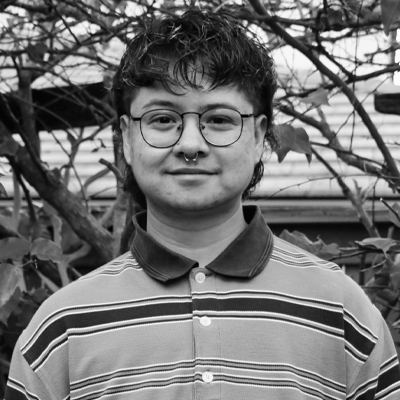 Graduate Student Profile
Graduate Student Profile
Sammi Mrowka
Sammi Mrowka, set to graduate this May, is a graduate student in the RWS M.A. program with a focus in professional writing. He always intended to pursue graduate studies, but was uncertain about which discipline would be best for his academic and professional interests until he spoke with people involved in the program about their experiences. “[The program] finally gave me the language to describe the type of work and research I was passionate about,” Mrowka explained. Although he had no background in rhetoric, having majored in psychology and minored in philosophy at Point Loma Nazarene University, his undergraduate studies provided him with a “well-rounded approach to analyzing rhetoric.”
When asked about meaningful courses taken, he recalls RWS 730: Gender and Rhetoric with Professor Suzanne Bordelon and RWS 602: Modern Rhetoric with Dustin Edwards as “instrumental” in exploring his research interests and preparing for his thesis. His thesis explores evangelical rhetoric’s impact on societal attitudes regarding LGBTQ+ individuals and how their narratives resist or reclaim their identities. As a queer, transmasculine person, the topic holds great significance for Mrowka. He envisions his thesis study as the beginning of impactful work: “I want to continue the work of my thesis by developing educational and workshop materials that address religious trauma and the importance of sharing embodied experiences. My goal is to create accessible resources that foster conversations about the impact of evangelical rhetoric on LGBTQ+ individuals.”
Outside the classroom, Mrowka works as a graduate assistant for the RWS Department, providing strategies to “strengthen and expand the program.” He developed recommendations by gathering undergraduate and graduate students’ insights on their experiences, goals, and perspectives. In addition, he assists the SDSU Pride Center as a graduate student Pride House lead, supporting Pride House, a mentorship program for first-year undergraduate LGBTQ+ students.
Reflecting on his time at SDSU coming to a close, Mrowka expresses gratitude for the department in supporting his academic and professional interests. He plans to apply skills he learned from the program to a career in technical writing, professional writing, or project management. Mrowka ends with valuable lessons for current RWS students: “Take full advantage of everything the program has to offer! The faculty and staff genuinely want to see you succeed, so don’t hesitate to reach out, whether for academic guidance, accommodations, or conversations about the evolving field of rhetoric. Building those connections can make all the difference in your experience and future career.”
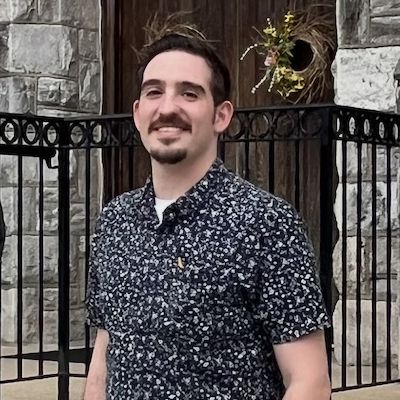 Undergraduate Alumnus Profile
Undergraduate Alumnus Profile
Erik Acosta
In spring 2022, Erik Acosta graduated from San Diego State University with a bachelor’s in rhetoric and writing studies. He currently works as a technical writer and project manager specializing in strategic supply chain products for General Atomics Aeronautical, a private company that manufactures aircraft. Acosta likens his position to an “internal ‘journalist’” applying what he learned from rhetoric and writing studies to support “the mission of ‘build plans and get them to fly.’” He explains this process: “I use the rhetoric of aviation, federal and legal compliance, and business, to produce documents that aid in decision-making, and balance competing interests via diplomacy. I have to read and understand [federal law’s implications] in my decision-making [and] the rhetoric of advanced technologies [to] translate them into business ‘leet speak.’”
When asked about an interesting project Acosta has completed, he recalls drafting and publishing manuals on flight and ground operations. He states: “My main job was to interview pilots, aircrew, technicians and mechanics to understand the inner workings of specific airfields, and I loved talking to every one of those folks. The inner workings of ‘making planes fly’ is an extremely complex endeavor!”
Acosta credits his career success to the RWS department. His study of RWS helped him take his “technical skills (fixing helicopters and airplanes) to the next level.” “RWS seemed to ‘marry’ perfectly to the skills I already had with the professional development that was necessary for me to transition into the technical writing and editing trade,” Acosta notes. Through his degree, he learned how to market himself as a professional, gained the ability to understand highly technical language, and developed the rhetorical skills necessary for speaking in cross-disciplinary contexts as two examples. “All incredibly valuable skills that translated into a paid job and future professional endeavors,” he says.
During his time in the RWS undergraduate program, he mentions a few professors as crucial to his academic journey. Through Jennifer Sheppard’s guidance, Acosta learned how to utilize visual rhetoric and create proposals for a professional audience; he continues to use these skills in his everyday work. In addition, Steve Merriam’s “passion for language” inspired him to approach language in more nuanced ways. Associate Professor Linn Bekins’ encouragement during a tough internship gave him the strength to push through difficulty and try again. In Professor Glen McClish’s classroom, Acosta enjoyed discovering the “timeless value” of ancient rhetoric. He identifies the “Mytilenean Debate” by Thucydides as a text that has stayed with him as it shows the potential of rhetorical appeals’ power for achieving “positive ends.”
Three years into Acosta’s post-graduation life, he still enjoys reading about “anything that piques [his] interests” and “[obsessing over the] nuances of applied language.” He looks back fondly on his time at SDSU, thanking the RWS department for their kind encouragement in his studies.
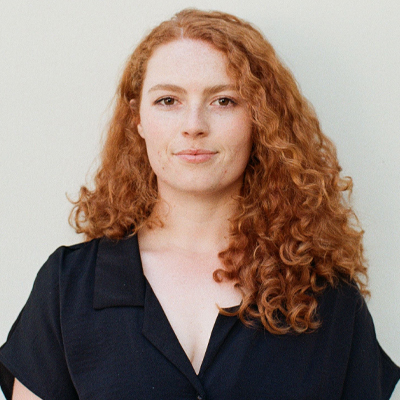 Graduate Student Alumnus Profile
Graduate Student Alumnus Profile
CiCi Hendricks
Cici Hendricks’ academic and professional journey reflects the power of rhetoric to shape not only arguments but also careers. A graduate of the RWS master’s program, Hendricks now applies rhetorical principles daily in a technical writing role within the environmental consulting and testing industry. Her current work centers on crafting detailed reports related to hazardous materials testing, combining analytical skill with practical communication strategies.
Though Hendricks’ present-day focus is highly specialized, her approach to learning has always been expansive. “As a student, I wanted to learn as much as possible from any and all sources,” she recalls. This curiosity led her to conduct informational interviews with professionals across disciplines. Over time, she refined her approach, shifting from broad information gathering to targeted research aimed at deepening her career expertise, a transition she describes as moving from a deductive to an inductive style of inquiry.
Her pathway to the RWS program began during her undergraduate years as an English major. While she enjoyed literary analysis, Hendricks gravitated more toward editing, publishing, and rhetorical studies rather than creative writing. After earning her degree and navigating the uncertainty of the COVID-19 pandemic, she recognized a desire to further develop her skills and found the RWS graduate program to be a perfect fit. “It gave me the opportunity to keep learning and to explore a more applied form of writing and communication,” she says.
Looking back, Hendricks cites her master’s thesis as one of the most formative and rewarding projects she has undertaken. Guided by her thesis chair, Dustin Edwards, and her committee, she developed, researched, and authored the work from start to finish. “It was a passion project,” she says. “It’s still the largest document I’ve written as the sole author, and something I look back on with pride.”
Beyond academics, Hendricks emphasizes the significance of community in her graduate experience. The community she found provided a collaborative and supportive environment that fostered growth and lasting connections. “Everyone was so talented and generous with their time. Watching them pursue their own thesis projects was inspiring,” she reflects.
When asked what has stayed with her most from the program, Hendricks points to an important three concepts: audience, context, and purpose. “If you keep those in mind, you are really setting yourself and your project up for success,” she advises. She also credits professors such as Linn Bekins and Dustin Edwards with mentoring her through pivotal moments of her academic and professional development.
Today, Hendricks continues to apply the lessons of rhetoric in a tangible and impactful setting. “I wouldn’t have even known this industry existed without the RWS program,” she says. “It helped me find a career that connects my love of language with real-world application.”
 Faculty Profile
Faculty Profile
Kimball Taylor
With a career that bridges the fast-paced world of journalism and the reflective discipline of teaching, Lecturer Kimball Taylor brings a rare and dynamic perspective to San Diego State University’s Department of Rhetoric and Writing Studies (RWS). Since returning to SDSU in 2017, Taylor has dedicated himself to guiding students not only in the mechanics of writing but in the art of critical thinking — a skill he believes is essential for both personal growth and civil engagement.
Taylor’s connection to SDSU began during his time as a graduate student in the university’s MFA program. After earning his degree, he spent the next decade working as a journalist, traveling widely and immersing himself in compelling stories. “Journalism gets you out in the world and exposes you to the most interesting people and situations,” he explains. “But teaching is the other side of that coin. One is about collecting ideas; the other is about dispersing them.” For Taylor, both roles fulfill a shared purpose of engaging with ideas and communicating them meaningfully.
His teaching style reflects his passion for writing and his belief in the power of structure. “There are small, common-sense things that can improve anyone’s writing,” he says, noting that helping students understand how to build and analyze arguments is central to his approach. He often emphasizes structure not only as an organizational tool, but as an extension of the argument itself — something that can mirror and enhance rhetorical purpose. He emphasizes this in one of his classes, The Rhetoric of Board Sports, which he designed and taught this spring semester. The creation of the course was inspired by Taylor’s experience with the SDSU’s Surf/Skate Collaborative and his concept of using board sports as a lens through which to teach writing and rhetoric.
Taylor was drawn to the RWS Department’s unique position within the university. As he points out, every student at SDSU engages with the department through composition courses. “We come into contact with everyone,” he says. “I like that utilitarian idea. One of the core things we’re teaching is critical thinking — and I want to live in a community of critical thinkers.” He sees the department’s work as foundational to building a more thoughtful and engaged society, beginning with the student body and extending outward into the broader San Diego community.
Looking ahead, Taylor acknowledges the evolving challenges facing the discipline, particularly with the rise of artificial intelligence. “The department has a huge challenge,” he says. “AI is already impacting composition and critical thinking, and we’ll need to adapt quickly.” Despite these shifts, Taylor remains committed to the enduring value of rhetoric. At its core, he argues, rhetoric is about navigating the arguments we encounter and create in daily life — from personal relationships to public discourse. “To the extent that we can analyze and build arguments well, we’re all better off,” he notes.
Outside the classroom, Taylor continues his work as a journalist, with current projects underway that remain confidential until publication. Still, the influence of journalism permeates his teaching, especially in his focus on structure and storytelling as vehicles for effective argumentation.
For students navigating their own academic paths, Taylor encourages attention to the form and function of their writing. “The structure on the page is part of the argument,” he says. “If you can master that, your writing becomes something much more powerful.”
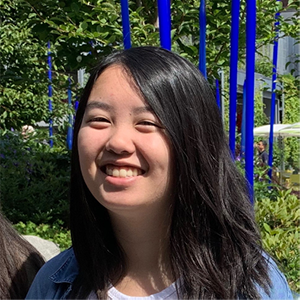
Amy Fong
Amy Fong is a second-year graduate student for the M.A. program in rhetoric and writing studies. When she was working toward a B.A. in English here at San Diego State University, her undergraduate advisor recommended trying her hand at the Certificate in Professional Writing program offered by the RWS Department. During this period, Fong developed further interest in what rhetorics could offer her professionally and personally. After finishing her B.A., she decided to apply for the M.A. program with a focus in professional writing to help develop her career in technical writing. Fong is thankful to RWS Chair Kathryn Valentine for the opportunity to continue working with the department.

Kee James
Kee James is a Seattle native and writer set to graduate in fall 2025 with a B.A. in rhetoric and writing studies from San Diego State University. With a strong background in research, rhetoric, and editing, she is especially passionate about investigative journalism and the role of language in driving social change. James hopes to build a career in the publishing industry, where she can continue exploring the power of storytelling and truth-seeking. When she’s not writing or editing, you’ll likely find her reading a good book with a strong cup of coffee in hand — her favorite way to recharge.